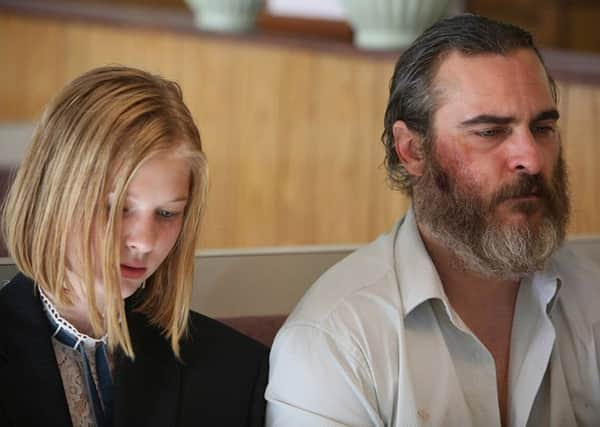Film reviews: You Were Never Really Here | Sweet Country | Mom and Dad | Bombshell: The Hedy Lamarr Story | Walk Like a Panther


You Were Never Really Here (15) *****
Sweet Country (15) ****
Mom and Dad (15) **
Bombshell: The Hedy Lamarr Story (12A) ****
Walk Like a Panther (12A) *
Marking the return of Lynne Ramsay, You Were Never Really Here sees the Glaswegian auteur deliver her first action movie (of sorts) with all the artistic nous you’d expect from the filmmaker behind Ratcatcher, Morvern Callar and We Need to Talk About Kevin. Like those films, it zeroes in on another damaged, taciturn character responding to trauma in unusual ways; unlike those films it’s more of a genre experiment, one that embraces the hardboiled tropes of Jonathan Ames’ source novella to provide this otherwise abstract, sensorial film with a propulsive narrative momentum. Joaquin Phoenix takes the lead as Joe, a PTSD-afflicted veteran and former FBI agent who specialised in exfiltrating sex-trafficked children for clients who can’t, or won’t, go to the police.
The plot takes shape around a job involving the missing daughter of Alessandro Nivola’s up-for-re-election governor, but Ramsay is more interested in the psychological headspace of her hammer-wielding avenging angel protagonist: foregrounding the background chaos of her New York locations to give us a sense of the madness he feels, and shooting the violence – which becomes less mechanical the more personally involved Joe gets in the case – in a way that helps track his own redemptive journey. Throughout we get little flickers of deranged humour – particularly in Joe’s affectionate relationship with his elderly mother (played by Judith Roberts) – that provide more clues to his troubled past.
Advertisement
Hide AdArtfully deployed flashbacks, meanwhile, further hint at unimaginable horrors both professional and personal. Phoenix – burly and bearded, like a hulking marine gone to seed – has just the right level of inscrutable intensity to pull all this off, moving through the city like a spirit shocked to discover his own humanity in the midst of all this grime. What a film.
There’s nothing sweet about Sweet Country, a brutal, bloody Outback western from director Warwick Thornton, who made the excellent Samson & Delilah back in 2009. Here he uses western tropes to zero in on the savage racism of Australia, exploring the deep-rooted conflict between Aboriginal Australians and their entitled white oppressors in the late 1920s. Indigenous actor Hamilton Morris takes the lead as Sam, a farmhand pursued by a posse of racist lawmen (led by Bryan Brown) through the unforgiving landscape after killing a white man in self-defence. That’s only one part of a meandering – but in a good way – plot. Thornton – who serves as his own cinematographer – uses this to paint a pitiless yet poetic portrait of life on the Australian frontier, deploying flash-cuts that jump forward in the action to give us a sense of the tragic inevitability of violence when people are forced to stand up for themselves in a hideously prejudiced world. Sam Neill co-stars.
In the so-called Golden Age of Hollywood, Hedy Lamarr was a screen goddess whose beauty blinded people to her brains. That’s the thesis of Bombshell: The Hedy Lamarr Story, an entertaining examination of the incredible secret life she led as a science-minded inventor whose
love of tinkering away on gadgets led her to develop the technology that, years later, would serve as a blueprint for wi-fi. First time director Alexandra Dean traces this story in slick, clear style, augmenting the mix of talking-head interviews, archival footage and Lamarr’s own voice (courtesy of recently uncovered interviews from the 1990s) with animated flourishes that draw out her hidden passions.
The result is a story of incredible intrigue and awful misogyny, her significance to the scientific community often dismissed as the work of a spy or a plagiarist, as if all she was good for was using her looks and sexuality to coax information out of men. Appropriately for someone whose looks did provide the inspiration for Catwoman, her tale is described by an admiring Google employee as the perfect “crime-fighter-by-night” story. But it’s Lamarr who sums up her own apparent contradictions best: “I’m just a simple complicated woman.”
Mom and Dad, the latest vehicle for Nicholas Cage, has one of those deliciously sick horror movie premises that always manage to sound cool on paper but rarely live up to their promise on screen. In this instance, a zombie-style pandemic that turns parents into infanticidal maniacs is the outré hook, but aside from a couple of vintage moments of crazy Cage letting his freak flag fly – the most memorable being a rendition of the Hokey Cokey pitched at a level of insanity close to his alphabet recitation in Vampire’s Kiss – the film’s gonzo potential is destroyed by Brian Taylor’s ADHD-style direction. Taylor – of Neveldine and Taylor fame, directors of the Crank movies – has never met a camera angle he didn’t like nor a shot he wanted to hold for more than a few seconds. Here his tweaked-out style ruins any satirical import inherent in the Generation X-vs-Millennials premise and, ironically, it also diminishes the film’s full-tilt depravity by coyly obscuring any explicitness in a rush of fast edits.
Advertisement
Hide AdJust when it seemed like we were done with knock-offs of The Full Monty, along comes Walk Like a Panther to pound the crumbling bones of its already decomposed corpse into dust. A group of disenfranchised working class men (among them Stephen Graham and I, Daniel Blake’s Dave Johns) rally to save their local pub by reviving their World of Sport-era wrestling glory days. Awful in ways that seemed hitherto unimaginable. ■